 Petzlover
Petzlover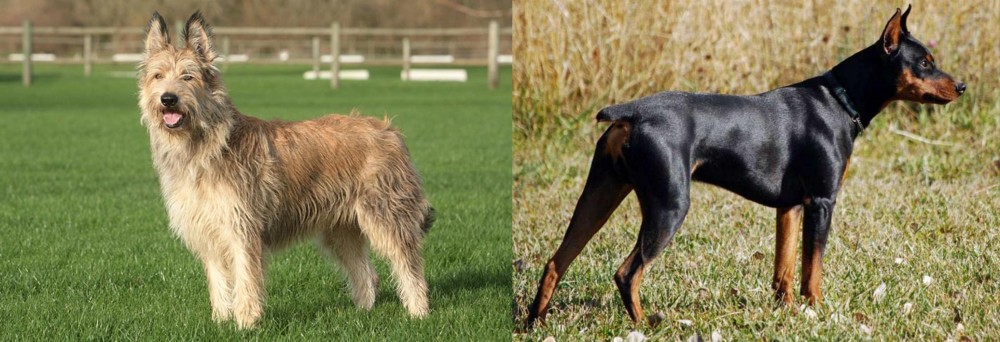 Berger Picard is originated from France but German Pinscher is originated from Germany. Berger Picard may grow 15 cm / 6 inches higher than German Pinscher. Berger Picard may weigh 12 kg / 27 pounds more than German Pinscher. Both Berger Picard and German Pinscher has same life span. Both Berger Picard and German Pinscher has almost same litter size. Both Berger Picard and German Pinscher requires Low Maintenance.
Berger Picard is originated from France but German Pinscher is originated from Germany. Berger Picard may grow 15 cm / 6 inches higher than German Pinscher. Berger Picard may weigh 12 kg / 27 pounds more than German Pinscher. Both Berger Picard and German Pinscher has same life span. Both Berger Picard and German Pinscher has almost same litter size. Both Berger Picard and German Pinscher requires Low Maintenance.
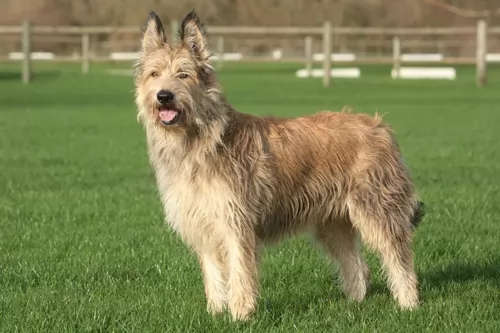 In the Picardie region of northeastern France saw visiting Celts/Franks enter the region along with a shepherd dog. They arrived in the Pas de Calais in 800 AD and might be the oldest shepherd dog of France. Named for Pacardy, the Berger Picard is certainly one of the most ancient of today’s French breeds. Some believe this shepherd comes from the lines of Dutch and Belgian Shepherds, while other insist he is related to the Beauceron and Briard.
In the Picardie region of northeastern France saw visiting Celts/Franks enter the region along with a shepherd dog. They arrived in the Pas de Calais in 800 AD and might be the oldest shepherd dog of France. Named for Pacardy, the Berger Picard is certainly one of the most ancient of today’s French breeds. Some believe this shepherd comes from the lines of Dutch and Belgian Shepherds, while other insist he is related to the Beauceron and Briard.
Never popular as a show dog due to its shaggy appearance, even though it was entered in Frances first dog show in 1863, the breed was almost extinct following the second World War. Currently there are a little under 5000 left in the world with most of them, 3000, in France. The Picard is a good herding dog and loved by the shepherds of the Picardy region. The United Kennel Club recognized the rare breed in 1994, but the AKC did not recognize it until 2016.
The Berger Picard is a loyal, people-oriented dog, good with children and families if socialized as a puppy. In 2006 the Berger Picard Club of America was formed as more and more dogs are being imported from France. There was a genetic study done this year that proposes that 7 breeds of shepherd all descended from a European herding dog that was all over Europe before 1859. This dog was the father of the Berger Picard, the German Shepherd, The Bergamaso Shepherd, the Lupino de Gigante, the Cane Paratore, the Cane da pasore della Lessinia e del Lagorai , and the Pastore d”oropa. After recognition, the Picard was shown for the first time at Krufts in March 2016. They followed that with a best of breed win by Gabby, Guess V.D. Benedicks
 The German Pinscher or Deutscher Pinscher originates in Germany. When you look at the dog you can see the the Doberman, the Rottweiler, Schnauzer, Affenpinscher and Miniature Pinscher have all played a role in the dog’s development.
The German Pinscher or Deutscher Pinscher originates in Germany. When you look at the dog you can see the the Doberman, the Rottweiler, Schnauzer, Affenpinscher and Miniature Pinscher have all played a role in the dog’s development.
There have been drawings of the German Pinscher which have been seen in dog books as early as 1884 and some drawings even earlier than this date. The dogs have descended from early European herding breeds.
The German Pinscher came to breeders of the United States in the 1980s, and the German Pinscher Club of America was started by German Pinscher fanciers, with the dog gaining acceptance by the Canadian Kennel Club in 2000.
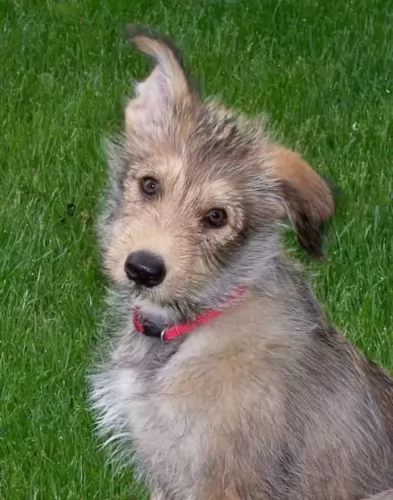 The Berger Picard is a muscular, medium sized, faithful companion. He is especially great with an owner who is athletic and energetic. They have a rugged constitution, slightly longer back, and full tail. The coat is thick, strong and harsh. They are never overweight or bulky. This gives the Berger Picard the look of a mixed breed dog. They have erect ears and thick eyebrows. This lanky looking dog is alert and lively. Movement is efficient, free and tireless. They have strong bones with a sturdy build and a take charge personality.
The Berger Picard is a muscular, medium sized, faithful companion. He is especially great with an owner who is athletic and energetic. They have a rugged constitution, slightly longer back, and full tail. The coat is thick, strong and harsh. They are never overweight or bulky. This gives the Berger Picard the look of a mixed breed dog. They have erect ears and thick eyebrows. This lanky looking dog is alert and lively. Movement is efficient, free and tireless. They have strong bones with a sturdy build and a take charge personality.
They have a strong rectangular head that is not massive. His eyes are oval and medium sized, never round or protruding. Eye color should be dark and never yellow. Cheek muscles are strong, and muzzle is smooth, ending abruptly at the nose. Scissors bite, deep chest and round feet. There should not be any dewclaws on the back legs.
 The German Pinscher is a medium sized dog with a square build, looking very much like the Doberman Pinscher we know so well, but slightly smaller. Dogs and bitches stand roughly 45 to 50cm at the withers and the dog weighs between 14 to 20kg.
The German Pinscher is a medium sized dog with a square build, looking very much like the Doberman Pinscher we know so well, but slightly smaller. Dogs and bitches stand roughly 45 to 50cm at the withers and the dog weighs between 14 to 20kg.
The dog is lean and muscular with a tight fitting skin. He has a short, smooth coat which can be brown, reddish brown or black and tan. He has a black nose, dark eyes and he has either high set drop ears or the ears are specifically erect.
In fact, with German Pinschers, they have always had their ears cropped and their tails docked, but these days the tail is left and unfortunately that distinctive look is gone.
Energetic, spirited, lively, confident, intelligent, fearless and loyal are just some of the characteristics of this amazing dog who is guaranteed to make you an excellent watchdog and companion.
The German Pinscher is a playful, good natured dog and he’ll make a good pet for households where there are other pets as well as children. He is a loving and loyal companion with an even temperament, although he is strong-willed and stubborn and will therefore need training and socialization. He then becomes a super obedient pet.
He can fit into city- or country life but he is an energetic dog and will certainly require being exercised every day. Like any other dog, he can become bored and frustrated when put into the backyard and left there by himself day after day.
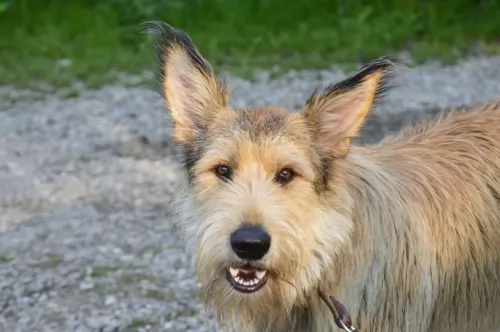 The Berger Picard needs to be a part of a pack with an owner who is clearly the pack leader. This is an intelligent, friendly, and sensitive to harsh voice scolding. They are not easy to train, and you need to be calm and patient when working with him. The Picard has a tendency to be stubborn with an owner who appears to be weak. If raised with or socialized to children and other animals, they will live fine with them. They are best in a rural environment rather than a close neighborhood. They are very quiet dogs, but they need a job and they excel at work.
The Berger Picard needs to be a part of a pack with an owner who is clearly the pack leader. This is an intelligent, friendly, and sensitive to harsh voice scolding. They are not easy to train, and you need to be calm and patient when working with him. The Picard has a tendency to be stubborn with an owner who appears to be weak. If raised with or socialized to children and other animals, they will live fine with them. They are best in a rural environment rather than a close neighborhood. They are very quiet dogs, but they need a job and they excel at work.
 The German Pinscher is a working dog bounding in energy. He just loves being involved with all the activities of his human family.
The German Pinscher is a working dog bounding in energy. He just loves being involved with all the activities of his human family.
He is playful and assertive and will require a firm, balanced owner who is consistent with the rules laid down for the dog. It will be more than worthwhile having him trained and socialized as he becomes obedient, loyal and devoted.
He is intelligent and quick to learn and it simply turns him into a splendid pet. Add him to your family, and you’ll feel as though you’ve added a wonderful dimension to your home.
 The Berger Picard is not a heavy or extra-large dog, but they still can have hip dysplasia, though it is not nearly as prevalent as it is in larger breeds. Eye infections can present in puppies more than adults and hereditary eye issues such as PRA and RD are all too common. (Progressive Retina Atrophy and Retinal Dysplasia)
The Berger Picard is not a heavy or extra-large dog, but they still can have hip dysplasia, though it is not nearly as prevalent as it is in larger breeds. Eye infections can present in puppies more than adults and hereditary eye issues such as PRA and RD are all too common. (Progressive Retina Atrophy and Retinal Dysplasia)
 When you see your German Pinscher standing lean and strong, you can’t think of him ever getting an illness. And yet, even a strong dog like this, who can reach 10 – 14 years of age with good nutrition, can get sick.
When you see your German Pinscher standing lean and strong, you can’t think of him ever getting an illness. And yet, even a strong dog like this, who can reach 10 – 14 years of age with good nutrition, can get sick.
Look out for von Willebrand's blood-clotting disorder as well as heart disease and hip dysplasia with your German Pinscher.
This is a blood disease where there is a deficiency of von Willebrand Factor which results in the blood not clotting properly. The condition can lead to excessive bleeding with your pet after he has had an injury for instance.
You may notice bleeding from the gums, bloody urine or feces as well as bruising of the skin. Get him to the vet who will perform an examination of your pet.
Remember that some health problems seen in a dog are inherited, and if you can get certificates from the breeders proving that the parents have been cleared of hereditary eye diseases, hip dysplasia and blood clotting disease for instance, your dog will have less risks of developing any of these serious conditions.
Also many illnesses can be eliminated by providing your pet with excellent food, clean water, a warm dry place to sleep and lots of love and attention.
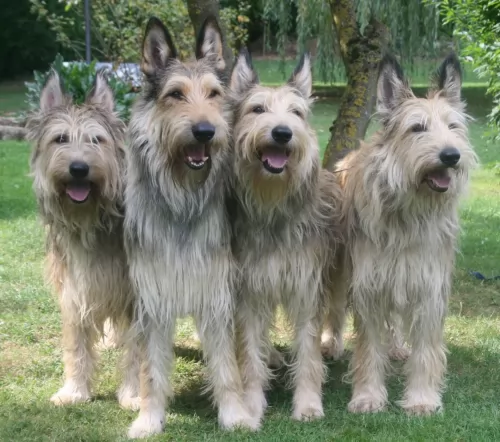 This is an athletic and active breed with a lot of energy. They need a high-quality food that is full of nutrients and not empty calories. Don’t overfeed him as some will have a tendency to become obese. They should be fed twice a day in equal proportions. Treats are good when training but don’t overdo it.
This is an athletic and active breed with a lot of energy. They need a high-quality food that is full of nutrients and not empty calories. Don’t overfeed him as some will have a tendency to become obese. They should be fed twice a day in equal proportions. Treats are good when training but don’t overdo it.
Since the Berger Picard has not been overbred, there are not a lot of genetic disorders in the breed. They do have some
You should have your puppy certified by the Orthopedic Foundation for Animals (OFA) and then the Canine Eye Research Foundation that they do not have these issues and if they do, resolve them. The results of these tests should be published in the OFA registry. This breed is also a participant in the Canine Health Information Center. This means their eyes and hips have been checked and the results published. Their blood is being stored for DNA purposes and one of the following have been evaluated: heart, elbows or thyroid. There is an OFA Berger Picard health survey whose results are available to anyone who asks. This does not track individual dogs but the breed as a whole.
This is a breed that needs a lot of exercise. She likes to swim, take long walks, take runs with you on your bike. They love to jog with you as well. Agility, obedience and any other type of competition will appeal to your Picard. However, don’t expect them to excel at competition because they are not consistent performers. But if they don’t get enough exercise and fun they will become very destructive. Barn hunt and non-competitive herding activities are perfect for the Picard.
 The German Pinscher, because he is a muscular, energetic dog, should be fed a high-quality dog food that suits his size and his energy levels. If you feed him one of the commercially manufactured dog foods, make sure of the ingredients, as you don’t want food that is full of fillers, colorants and preservatives.
The German Pinscher, because he is a muscular, energetic dog, should be fed a high-quality dog food that suits his size and his energy levels. If you feed him one of the commercially manufactured dog foods, make sure of the ingredients, as you don’t want food that is full of fillers, colorants and preservatives.
Choose high quality foods and sometimes mix in your own home cooked brown rice, vegetables and chicken. Adding in some raw meat occasionally will enhance his health too and help him towards staving off common dog illnesses. He should always have access to fresh, cool water.
He is a high energy dog and will require hectic exercise such as ball- and rope-pulling games, hikes, swimming and walks every day.
His short, smooth coat will require brushing twice a week to remove loose hairs and help it to maintain that sleek, glossy look.
Remember to check his ears for wax and dirt build up as well as for ear hematomas. These swellings inside your dogs ear can also be as a result of something stuck inside your dog’s ear or from your dog scratching his ear because of mites.